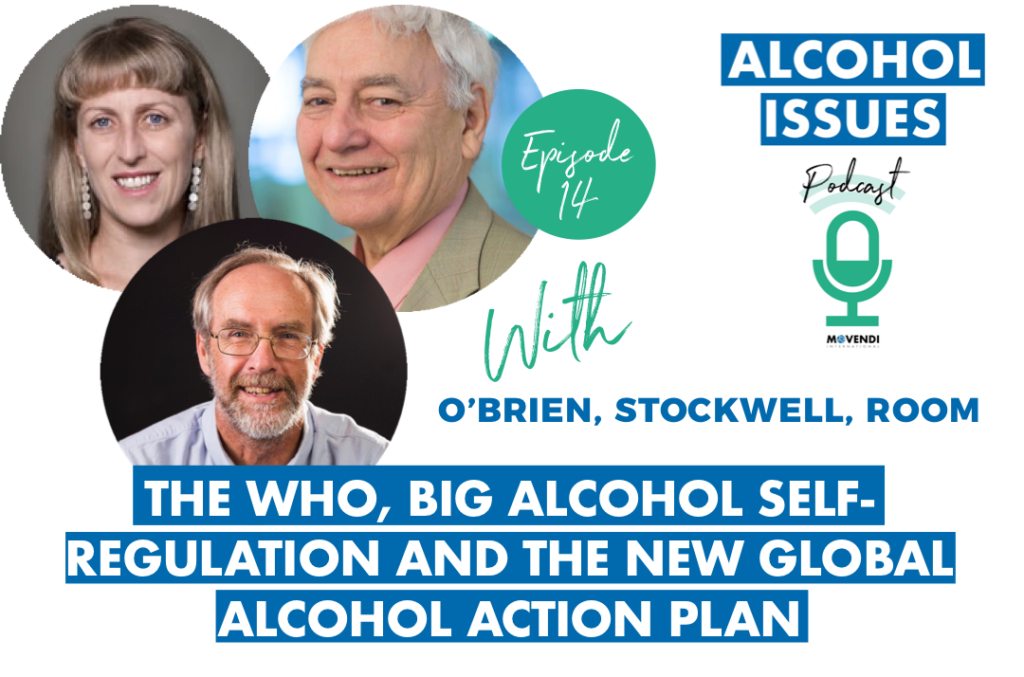EPISODE 14 – THE ALCOHOL ISSUES PODCAST
Together with Kate Vallance they wrote an editorial in the latest Addiction Journal with the title: “WHO Should Not Support Alcohol Industry Co‐Regulation of Public Health Labelling”.
Paula O’Brien is an Associate Professor at Melbourne Law School. She specialises in public health law in her research and teaching. Associate Professor O’Brien researches in the area of public health law, with a focus on: the regulation of corporate conduct to protect human health; international economic law and human health; and the regulation of health care systems.
Professor Robin Room, of the Centre for Alcohol Policy Research (CAPR), is a sociologist who has directed alcohol and drug research centres in the United States, Canada, Sweden, and Australia. He has been an advisor for the World Health Organization since 1975, and has received awards for scientific contributions in the USA, Sweden and Australia. Professor Room has worked on social, cultural and epidemiological studies of alcohol, drugs and gambling behaviour and problems, and studies of social responses to alcohol and drug problems and of the effects of policy changes.
Professor Tim Stockwell is the Director of the Canadian Institute for Substance Use Research (CISUR) and a Professor in the Department of Psychology at the University of Victoria. He has published over 400 research papers, book chapters and monographs, plus several books on prevention and treatment issues. Professor Stockwell’s research interests include: prevention of alcohol and other drug related harm; regulatory policies to reduce alcohol-related harm; measurement of alcohol consumption and related harms.

They discuss the editorial in detail to explore the reasons why the alcohol industry should not be invited to co-regulate alcohol labelling. Beyond that, they also talk about the scientific evidence on alcohol health warning labelling and alcohol industry self-regulation.
To expand the conversation beyond the specific WHO proposal to invite Big Alcohol to self-regulate alcohol labelling, the conversation also dives into potential and possibilities for improvements to the global governance of alcohol that the three experts envision and hope for.
And finally, host Maik Dünnbier discusses with the three experts an important point in their editorial that also has larger significance: what does it mean to remove the alcohol industry from their position of influence?
Resources for the conversation with Paula, Robin and Tim
Read the complete editorial here.
- Learn more about Associate Professor Paula O’Brien work at Melbourne Law School.
- Follow Robin Room’s Centre for Alcohol Policy Research (CAPR) at La Trobe University on Twitter.
- Follow Tim Stockwell’s Canadian Institute for Substance Use Research (CISUR) on Twitter.
Read the analysis #1: “Exposed: The Strategies Big Alcohol Deploys to Interfere in WHO Alcohol Policy Consultation”
Read the analysis #2: “Big Tobacco’s Strategic Ally Interferes in WHO Alcohol Policy Consultation”
Listen to the first podcast: “Exposing the major strategies of the alcohol industry to derail the development of the WHO alcohol action plan”
Listen to episode 14
- Listen to episode 14 of the Alcohol Issues Podcast wherever you get your podcasts.
- You can find the brand new episode on Apple podcasts, here.
- You can also listen to the latest episode on Spotify.
- And you can find episode 12 on Google Podcasts, as well as on Podbean, here.
More about the WHO alcohol action plan consultation
A decision unanimously adopted at the World Health Organization’s Executive Board meeting in February 2020 called the global alcohol burden a “public health priority”. In the decision, countries request “accelerated action” on alcohol harm and decided to task WHO with developing, among other things, a global alcohol action plan to improve the implementation of the WHO Global Alcohol Strategy.
In November 2020, the WHO has launched the first step of an extensive consultation process: a web-based consultation on the working document to develop an action plan for more effective implementation of the Global Alcohol Strategy.
Movendi International had already conducted a thorough analysis of the implementation of the WHO Global Alcohol Strategy in the decade since its adoption, as part of its contribution to the review process in 2019. Analysis showed that the WHO Global Alcohol Strategy – despite having facilitated some success – is ineffective, inadequate and in parts outdated to protect people from the harm caused by the products and practices of the alcohol industry.
In February 2021, the WHO published all consultation contributions. Rapid analysis shows that civil society and community contributions – with a substantial number of Movendi International members – outperform the Big Alcohol lobby by far. Out of 253 total submissions, civil society and community groups are responsible for more than 130 submissions. Movendi International alone has supported ca. 40 consultation contributions – meaning approximately one-third of civil society submissions, as Movendi members also contributed to the development of submissions by partners and alcohol policy alliances. Big Alcohol – including producers, advertisers, lobby front groups, trade associations and industry-funded think tanks – stands for only ca. 75 submissions.
Rapid analysis of the alcohol industry submissions reveal a concerted effort of the alcohol industry deploying the Big Tobacco strategy and network where think tanks interfere on behalf of the industries in public health policy making. This mobilization of Big Tobacco’s network to undermine alcohol policy development at the WHO calls into question even more why the alcohol industry is allowed to participate in the first place.
In a second analysis, we reviewed 16 submissions of major alcohol industry front groups from around the world. This brought to light a number of surprising and a few shocking elements.
There are clear commonalities and even through-lines across the Big Alcohol submissions.
Exposing the major claims the alcohol industry makes to undermine the development of the global alcohol action plan highlights the contradictions, shortcomings and the PR-spin the alcohol industry applies even to a technical consultation on a specific issue.
